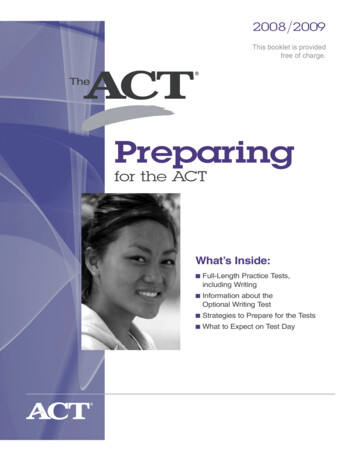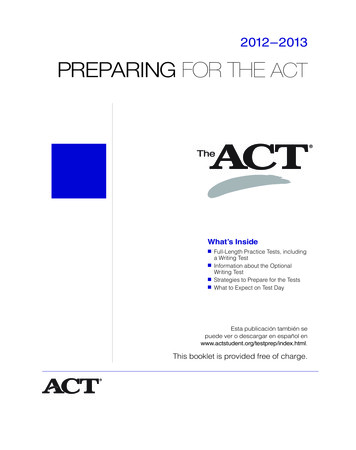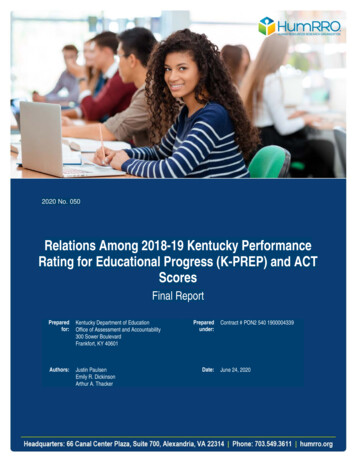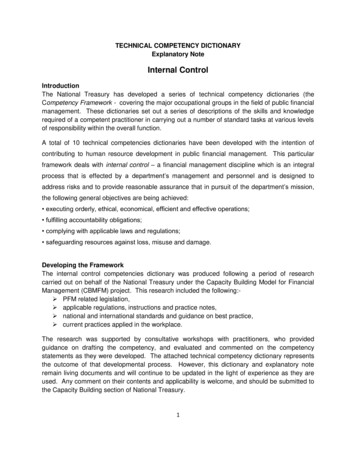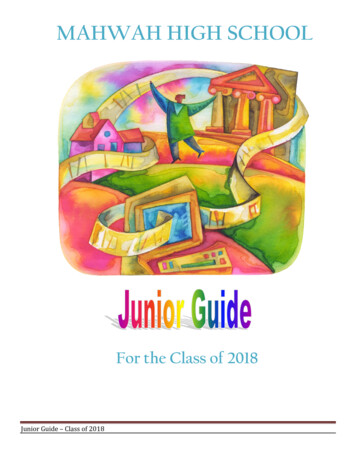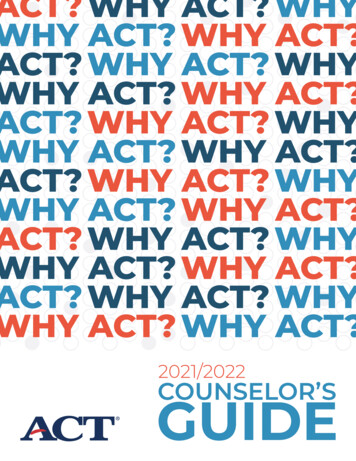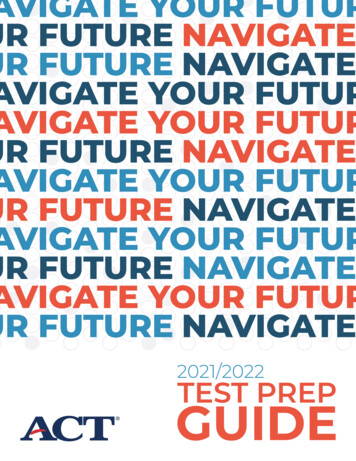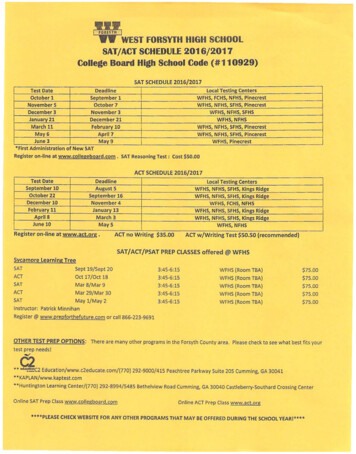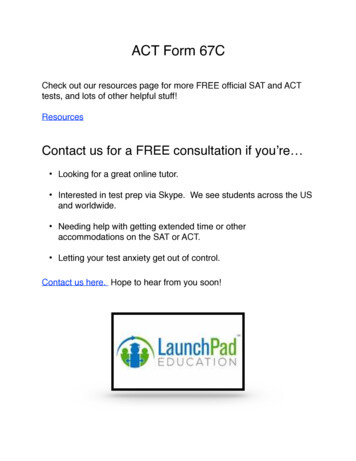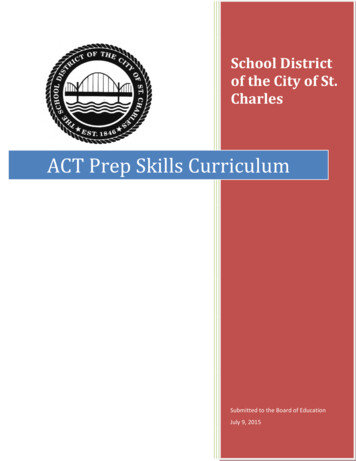
Transcription
School Districtof the City of St.CharlesACT Prep Skills CurriculumSubmitted to the Board of EducationJuly 9, 2015i
ACT Prep Skills Curriculum CommitteeLead FacilitatorTed Happel, St. Charles High School, St. Charles West High School, Assistant PrincipalCommittee MembersChristina Pupillo, St. Charles High School, Math2
ACT Prep Skills CurriculumTABLE OF CONTENTSTable of Contents .3Mission Statement .4District Vision .4District Values .4District Goals .5Philosophical Foundations .6Scope and Sequence .7Rationale and Course Descriptions .9ACT Prep Skills CurriculumACT Prep Skills Curriculum Overview . 11-12ACT Prep Skills – All Subjects . 13-54Curriculum UnitsACT Prep Skills – Math and Science . 55-76Curriculum UnitsACT Prep Skills – English/Reading/Writing . 77-94Curriculum UnitsAppendix . 95Show Me Standards3
District MissionThe City of St. Charles School District will REACH, TEACH, and EMPOWER all students by providing a challenging,diverse, and innovative education.District VisionThe City of St. Charles School District will be an educational leader recognized for high performance and academicexcellence that prepares students to succeed in an ever-changing global society.District ValuesWe, the City of St. Charles School District community of students, parents, staff, and patrons, value: High quality education for all students which includes: Lifelong learning from early childhood through adult education Rigorous learning experiences that challenge all students Instruction that meets the needs of a diverse community Respect for all Real world, critical thinking and problem-solving skills to prepare students for the 21st Century Developing caring, productive, and responsible citizens Strong engagement of family and community A safe, secure, and nurturing school environment Achievement through: Celebration of individual successCollaboration with parents and community stakeholdersExploration, Innovation, and creativity High quality staff by: Hiring and retaining highly qualified and invested employeesProviding professional development and collaboration focused on increasing student achievementEmpowering staff to use innovative resources and practices Informed decisions that are: Student-centeredFocused on student achievementData DrivenConsiderate of all points of viewFiscally responsible4
District GoalsFor planning purposes, five overarching goals have been developed. These goals are statements of the key functionsof the school district.1. Student Performance Develop and enhance the quality educational/instructional programs to improve student performanceand enable students to meet their personal, academic, and career goals.2. Highly qualified staff Recruit, attract, develop, and retain highly qualified staff to carry out the District’s mission, vision, goals,and objectives.3. Facilities, Support, and Instructional Resource Provide and maintain appropriate instructional resources, support services, and functional and safefacilities.4. Parent and Community Involvement Promote, facilitate and enhance parent, student, and community involvement in district educationalprograms.5. Governance Govern the district in an efficient and effective manner providing leadership and representation tobenefit the students, staff, and patrons of the district.5
School District Philosophical FoundationsTeachers in the School District of the City of St. Charles share in and ascribe to a philosophy that places children atthe heart of the educational process. We feel that it is our professional responsibility to strive to be our best at alltimes and to maximize our efforts by ensuring that the following factors are present in our classrooms and ourschools.1.2.3.4.5.6.7.8.9.10.Learning is developed within the personal, physical, social, and intellectual contexts of the learner.A strong educational program should provide developmental continuity.The successful learner is motivated, strategic, knowledgeable, and interactive.Children learn best when they have real purposes and can make connections to real life.Effective learning is a combination of student exploration and teacher and mentor modeling.Assessment is an ongoing and multidimensional process that is an integral part of instruction.Making reading and writing connections across multiple sources and curricula facilitates meaning.Literacy for the future means literacy in multiple technologies.Education must respond to society’s diverse population and serve all children.Interactions among students, teachers, parents, and community form the network that supports learning.6
ACT Prep Skills Scope and SequenceACT TEST EXAM ESSENTIALS1. Structure of the test2. Purpose of the test3. Test score usageIIIACT TEST STRATEGIES1. Self Evaluation Skills2. Develop Individual Learning PlanA. Evaluate Pre-test dataB. Set learning goals based on dataC. Monitor progress3. Learning and implementing ACT test strategiesA. Multiple Choice question strategiesB. Essay writing strategiesC. Practical TipsMMMMMMMMMMATH1. Basic operations and applications2. Probability, statistics, and data analysis3. NumbersA. ConceptsB. Properties4. Expressions, equations, and inequalities5. Graphic representations6. Properties of plane figures7. Measurement8. FunctionsRRRRRRRRRRSCIENCE1. Interpretation of data2. Scientific investigation3. Evaluation of models, inferences, and experimental resultsRRRREADING1. Main ideas and author’s approach2. Supporting details3. Sequential, comparative, and cause/effect relationships4. Meanings of words5. Generalizations and conclusionsRRRRRENGLISH1. Topic development in terms of purpose and focus2. Organization, unity, and coherence3. Word ChoiceA. StyleB. ToneC. ClarityD. EconomyRRRRRRR7
RRR4. Sentence Structure and Formation5. Conventions of Usage6. Conventions of PunctuationWRITING1. Expressing judgments2. Focusing on a topic3. Developing a position4. Organizing ideas5. Using languageI IntroduceRRRRRE EnhanceR ReinforceM Master8
ACT Prep RationaleThrough ACT Prep coursework, students will understand the structure and purpose of the test, acquire test-takingstrategies specific to the ACT exam, and will build content knowledge for successful completion of the ACT exam.The curriculum is organized around essential strands including English, reading, writing, and/or science, and math.Through their completion of the ACT Prep course, students will:1. Analyze their personal practice test results.2. Utilize test results in post secondary educational opportunities.3. Increase test taking skills and potentially improve test scores.4. Use or improve content knowledge to increase subject skills and test scores.5. Process and evaluate informational text to determine main ideas, validity, and reliability.ACT Prep skills are an integral part of each student’s educational experience. More than a body of knowledge, thiscourse is essential for the development of test-taking abilities and increasing test scores. Through the ACT Prepprogram, students will be prepared to achieve success applicable to post secondary admissions and scholarships.Course Descriptions:ACT Prep Skills(Elective) ½ unit; 10-12;Prerequisite: English I and English II (or be currently enrolled in English II), Algebra I and Geometry (or be currentlyenrolled in Geometry)The purpose of ACT Prep is to increase student awareness of the importance and significance of preparation forimproving their ACT college entrance exam score. The students will become more confident of their ability withvarious concepts and relationships of the four areas tested by the ACT (Mathematics; Science; English; and Reading).Students will learn how9
to think systematically and use the precise logic required for solving typical problems found on the ACT exam. Activeinvolvement in and successful completion of the course should lead the student to greater confidence and higherscores on the ACT exam.ACT English & Reading(Elective) ½ unit; 10-12;Prerequisite: English I and English II (or be currently enrolled in English II)The purpose of ACT Prep is to increase student awareness of the importance and significance of preparation forimproving their ACT college entrance exam score. The students will become more confident of their ability of workwith various concepts and relationships of English, reading and writing. Students will learn how to thinksystematically and use the precise logic required for solving typical problems found on the ACT exam. Studentsenrolled in this class should be at least a sophomore with English I completed and or be enrolled in English II orhigher grade level. Active involvement in and successful completion of the course should lead the student to greaterconfidence and higher scores on the ACT exam.ACT Math & Science(Elective) ½ unit; 10-12;Prerequisite:Algebra I and Geometry (or be currently enrolled in Geometry)The purpose of ACT Prep Math and Science is to increase student awareness of the importance and significance ofpreparation for improving their ACT college entrance exam score. The students will become more confident of theirability with various concepts and relationships with the Math and Science areas tested by the ACT. Students willlearn how to think systematically and use the precise logic required for solving typical problems found on the ACTexam. Course will focus on: algebra, geometry, trig, data representation, research summaries, and conflictingviewpoints. Active involvement in and successful completion of the course should lead the student to greaterconfidence and higher scores on the Math and Science portions ACT exam.10
ACT Prep Skills CurriculumCurriculum Units, Proficiency Scales11
COURSE OVERVIEWCOURSE: ACT Prep SkillsCREDIT(S): 1/2 UnitPREREQUISITES: NoneCURRICULUM WRITTEN: Spring 2015BOARD APPROVAL:REVISED:COURSE DESCRIPTION: Through ACT Prep coursework, students willCOMMITTEE MEMBERS: Christina Pupillounderstand the structure and purpose of the test, acquire test-takingstrategies specific to the ACT exam, and will build content knowledge forsuccessful completion of the ACT exam. The curriculum is organizedaround essential strands including English, reading, writing, and/orscience, and math.UNITS IN THIS COURSEUNIT TITLEACT Prep Skills – All Subjects18 WeeksACT Prep Skills – Math and Science18 WeeksACT Prep Skills – English/Reading/Writing18 WeeksDISTRICT COMMON ASSESSMENTSUNIT DURATIONBOARD APPROVED INSTRUCTIONAL MATERIALS FOR THIS COURSETEXTBOOK INFORMATIONADDITIONAL INSTRUCTIONAL MATERIALS OR RESOURCESTITLE:Publisher: Princeton ReviewPrinceton Review: Cracking theEdition:ACT Premium 2015 Ed.Author:ISBN:TITLE:Publisher: McGraw-Hill500 ACT Math Questions toEdition:Know by Test DayAuthor:ISBN:TITLE:Publisher: McGraw-Hill500 ACT Science Questions toEdition:Know by Test DayAuthor:ISBN:TITLE:Publisher: McGraw-Hill500 ACT Reading and WritingEdition:Questions to Know by Test DayAuthor:ISBN:12
ACT Prep Skills – All SubjectsCurriculum Units, Proficiency Standards/Scales13
CONTENT AREA: ACT PreparationCOURSE: ACT Test PrepUNIT TITLE: Test-Taking StrategiesUNIT DURATION: 18 weeksMATERIALS / INSTRUCTIONAL RESOURCES FOR THIS UNIT: Reading(s) / Handouts TextbookBIG IDEA(S): Understanding the ACT Test and how scores will be used. Using test-taking strategies on the ACT test will improve a student’s score.ENDURING UNDERSTANDINGS: Test-taking strategies can be used to help improve test scores.ESSENTIAL QUESTIONS: Why should a student take the ACT? What strategies can a student use to complete a multiple choice question?WHAT SHOULD STUDENTS KNOW, UNDERSTAND, AND BE ABLE TO DO AT THE END OF THIS UNIT?Standards, Concepts, Content, Skills, Products, VocabularyREFERENCE/STANDARDSTANDARDS: Content specific standards that will be addressed in this unit.MAJORSUPPORTINGGLE/CLESTANDARD STANDARDCG 5aiUnderstanding the ACTCG 5aiACT Test-Taking Skills14
Understanding the ACTOBJECTIVE # 1REFERENCES/STANDARDS CG 5aiCCSSWHAT SHOULD STUDENTS KNOW?BE ABLE TO DO?Facts, Names, Dates, Places, Information,Skills; ProductsACADEMIC VOCABULARY The subjects that will be tested on the How to compute an ACT scoreACT Their personal scoring goalsFACILITATING ACTIVITIES – STRATEGIES AND METHODS FOR TEACHING AND LEARNINGTEACHER INSTRUCTIONAL ACTIVITYSTUDENT LEARNING TASKDOK TARGET(1 Recall, 2 Skill/Concept, 3 Strategic Thinking,4 Extended Thinking)3 Instructional Lesson Practice computing scoresINTERDISCIPLINARY CONNECTIONPRIOR KNOWLEDGE CONNECTIONS Math, Science, English and Reading Standardized test experiencesHOW DO WE KNOW WHAT STUDENTS HAVE LEARNED?ASSESSMENT DESCRIPTIONFORMATIVEDOK TARGET(1 Recall, 2 Skill/Concept, 3 Strategic Thinking, 4 ExtendedORThinking)SUMMATIVE?Summative3 Assessment on structure and scoring of the ACTHOW WILL WE RESPOND IF STUDENTS HAVE NOT LEARNED?Possible InterventionsTEACHER INSTRUCTIONAL ACTIVITYSTUDENT LEARNING TASKDOK TARGETUNDERSTAND?Concepts; essential truths that give meaning to the topic;ideas that transfer across situations. The structure of the ACT The importance of their ACT score(1 Recall, 2 Skill/Concept, 3 Strategic Thinking, 4 ExtendedThinking) 2-3 PracticeHOW WILL WE RESPOND IF STUDENTS HAVE ALREADY LEARNED?Possible Extensions/EnrichmentsINSTRUCTIONAL ACTIVITY/METHODSTUDENT LEARNING TASKProvide additional instructionDOK TARGET(1 Recall, 2 Skill/Concept, 3 Strategic Thinking, 4 ExtendedThinking) Self-guided assignment Student presentation on theinformation3-415
Strand: Test Taking StrategiesStandard 1: Understanding the ACTLevel: ACT PREPScore4.0Score3.0Score2.0In addition to Score 3.0, in-depth inferences and applications that go beyond what wastaught.3.5 In addition to score 3.0 performance, in-depth inferences and applications withpartial success.The student will be able to answer questions involving: Structure of the ACT Purpose and scoring goals Compute a raw scoreSample TasksThe student exhibits no major conceptual or computational errors or omissions.2.5 No major errors or omissions regarding 2.0 content and partial knowledge of the 3.0contentThere are no major errors or omissions regarding the simpler details and processes asthe student: performs basic processes, such as:showing knowledge to the tests focused on the ACTunderstanding the raw scoringHowever, the student exhibits major errors or omissions regarding the more complexideas and processes.1.5 Partial knowledge of the 2.0 content but major errors or omissions regarding the3.0 contentWith help, a partial understanding of some of the simpler details and processes andsome of the more complex ideas and processes.0.5 With help, a partial understanding of the 2.0 content but not the 3.0 contentEven with help, no understanding or skill demonstrated.ooScore1.0Score0.016
ACT Test-Taking SkillsOBJECTIVE # 2REFERENCES/STANDARDS CG 5aiCCSSUNDERSTAND?Concepts; essential truths that give meaning to the topic;ideas that transfer across situations. The test-taking techniques and when to applythemWHAT SHOULD STUDENTS KNOW?Facts, Names, Dates, Places, Information,ACADEMIC VOCABULARY The practical skills that should be donebefore and during the ACT TestBE ABLE TO DO?Skills; Products Use process of elimination, workingbackwards, and eliminating outliers toanswer questions on the ACTFACILITATING ACTIVITIES – STRATEGIES AND METHODS FOR TEACHING AND LEARNINGTEACHER INSTRUCTIONAL ACTIVITYSTUDENT LEARNING TASKDOK TARGET(1 Recall, 2 Skill/Concept, 3 Strategic Thinking,4 Extended Thinking)3 Instructional Lesson Practice using test-taking strategiesINTERDISCIPLINARY CONNECTIONPRIOR KNOWLEDGE CONNECTIONS Math, Science, English and Reading Standardized test experiencesHOW DO WE KNOW WHAT STUDENTS HAVE LEARNED?ASSESSMENT DESCRIPTIONFORMATIVEDOK TARGET(1 Recall, 2 Skill/Concept, 3 Strategic Thinking, 4 ExtendedORThinking)SUMMATIVE?Summative3 Assessment on structure and scoring of the ACTHOW WILL WE RESPOND IF STUDENTS HAVE NOT LEARNED?Possible InterventionsTEACHER INSTRUCTIONAL ACTIVITYSTUDENT LEARNING TASKDOK TARGET(1 Recall, 2 Skill/Concept, 3 Strategic Thinking, 4 ExtendedThinking) 2-3 PracticeHOW WILL WE RESPOND IF STUDENTS HAVE ALREADY LEARNED?Possible Extensions/EnrichmentsINSTRUCTIONAL ACTIVITY/METHODSTUDENT LEARNING TASKProvide additional instructionDOK TARGET(1 Recall, 2 Skill/Concept, 3 Strategic Thinking, 4 ExtendedThinking) Self-guided assignment Student presentation on theinformation3-417
Strand: ACT Test Taking StrategiesStandard 2: ACT Testing SkillsLevel: ACT PREPScore4.0Score3.0In addition to Score 3.0, in-depth inferences and applications that go beyond what was taught.3.5 In addition to score 3.0 performance, in-depth inferences and applications with partialsuccess.The student will be able to: Apply techniques to approach unknown questions Multiple choice strategiesThe student exhibits no major conceptual or computational errors or omissions.Score2.02.5 No major errors or omissions regarding 2.0 content and partial knowledge of the 3.0 contentThere are no major errors or omissions regarding the simpler details and processes as thestudent:reading directionsordering passages based on strengths (can, can’t, come back)identifying practical skillsHowever, the student exhibits major errors or omissions regarding the more complex ideasand processes.Score0.0 Process of EliminationWorking BackwardsAnswering every questionEliminating Outliers performs basic processes, such as:oooScore1.0Sample Tasks Before testo sleepo watcho eato layerso coming preparedDuring testo writing on the testo ranking questionso circling answers intest booko marking questions1.5 Partial knowledge of the 2.0 content but major errors or omissions regarding the 3.0contentWith help, a partial understanding of some of the simpler details and processes and some ofthe more complex ideas and processes.0.5 With help, a partial understanding of the 2.0 content but not the 3.0 contentEven with help, no understanding or skill demonstrated.18
CONTENT AREA: ACT PreparationCOURSE: ACT Test PrepUNIT TITLE: AlgebraUNIT DURATION: 3 weeksMATERIALS / INSTRUCTIONAL RESOURCES FOR THIS UNIT: Textbook Graphing Calculators Websites: www.usatestprep.com, www.learningexpresshub.comBIG IDEA(S): Pre-Algebra, Elementary Algebra, Intermediate AlgebraENDURING UNDERSTANDINGS: Mathematics allows us to see patterns that might have remainedunseen. Algebra can be used to solve for unknown variables.ESSENTIAL QUESTIONS: What methods can be used to solve for unknown variables?WHAT SHOULD STUDENTS KNOW, UNDERSTAND, AND BE ABLE TO DO AT THE END OF THIS UNIT?Standards, Concepts, Content, Skills, Products, VocabularyREFERENCE/STANDARDSTANDARDS: Content specific standards that will be addressed in this unit.MAJORSUPPORTINGCCSSSTANDARD STANDARDHSN-Q.A.2, 8.NS.A.1, 8.EE.A.1, 8.EE.A.4,Pre- Algebrax7.RP.A.3, 7.EE.A.1, HSS-MD.B.6HSN-Q.A.3; HSA-CED.A.1,A.2,A.3;Elementary AlgebraxHSA-REI.A.1, B.3, B.4, C.7, D.10;HSF-IF.A.1,A.2,C.9, HSF-LE.A.1, A.319
Pre-AlgebraOBJECTIVE # 3REFERENCES/STANDARDS HSN-Q.A.2, 8.NS.A.1, 8.EE.A.1, 8.EE.A.4, 7.RP.A.3, 7.EE.A.1, HSS-MD.B.6CCSSWHAT SHOULD STUDENTS UNDERSTAND?KNOW?BE ABLE TO DO?Concepts; essential truths that give meaning to the topic;Facts, Names, Dates, Places, Information,Skills; Productsideas that transfer across situations.ACADEMIC VOCABULARY Conceptual understanding of the real number Algebra Vocabulary Successfully answer algebra questions onsystemthe ACT Formulas Solving procedures for different situations Interpret what an ACT question is askingstudents to doFACILITATING ACTIVITIES – STRATEGIES AND METHODS FOR TEACHING AND LEARNINGTEACHER INSTRUCTIONAL ACTIVITYSTUDENT LEARNING TASKDOK TARGET(1 Recall, 2 Skill/Concept, 3 Strategic Thinking,4 Extended Thinking)3 Review Pre-Algebra Topics PracticeINTERDISCIPLINARY CONNECTIONPRIOR KNOWLEDGE CONNECTIONS Science Middle School MathHOW DO WE KNOW WHAT STUDENTS HAVE LEARNED?ASSESSMENT DESCRIPTIONFORMATIVEDOK TARGET(1 Recall, 2 Skill/Concept, 3 Strategic Thinking, 4 ExtendedORThinking)SUMMATIVE?Summative3 Pre-Algebra TestHOW WILL WE RESPOND IF STUDENTS HAVE NOT LEARNED?Possible InterventionsTEACHER INSTRUCTIONAL ACTIVITYSTUDENT LEARNING TASKDOK TARGET(1 Recall, 2 Skill/Concept, 3 Strategic Thinking, 4 ExtendedThinking) 2-3 PracticeHOW WILL WE RESPOND IF STUDENTS HAVE ALREADY LEARNED?Possible Extensions/EnrichmentsINSTRUCTIONAL ACTIVITY/METHODSTUDENT LEARNING TASKRe-teach Pre-Algebra TopicsDOK TARGET(1 Recall, 2 Skill/Concept, 3 Strategic Thinking, 4 ExtendedThinking) Self-guided assignment Practice higher-level ACT Questions3-420
Strand: AlgebraStandard 3: Pre-AlgebraLevel: ACT PREPScore4.0Score3.0Score2.0Score1.0Score0.0In addition to Score 3.0, in-depth inferences and applications that go beyond what wastaught.3.5 In addition to score 3.0 performance, in-depth inferences and applications withpartial success.The student will be able to solve problems involving: Exponent rules Rate, proportions, percents, tax, and distance Central Tendency and probabilityThe student exhibits no major conceptual or computational errors or omissions.2.5 No major errors or omissions regarding 2.0 content and partial knowledge of the 3.0contentThere are no major errors or omissions regarding the simpler details and processes asthe student: performs basic processes, such as:o Interpreting tableso Solve simple Pre-Algebra problems (see sample tasks)Sample TasksLea worked 22 hours this week andmade 132. If she works 15 hours nextweek at the same pay rate, how muchwill she make?(14-8)* (978/2 9)However, the student exhibits major errors or omissions regarding the more complexideas and processes.1.5 Partial knowledge of the 2.0 content but major errors or omissions regarding the3.0 contentWith help, a partial understanding of some of the simpler details and processes andsome of the more complex ideas and processes.0.5 With help, a partial understanding of the 2.0 content but not the 3.0 contentEven with help, no understanding or skill demonstrated.21
Elementary AlgebraOBJECTIVE # 4REFERENCES/STANDARDS HSN-Q.A.3; HSA-CED.A.1,A.2,A.3; HSA-REI.A.1, B.3, B.4, C.7, D.10; HSF-IF.A.1,A.2,C.9, HSF-LE.A.1, A.3CCSSWHAT SHOULD STUDENTS UNDERSTAND?KNOW?BE ABLE TO DO?Concepts; essential truths that give meaning to the topic;Facts, Names, Dates, Places, Information,Skills; Productsideas that transfer across situations.ACADEMIC VOCABULARY Conceptual understanding of the real number Algebra Vocabulary Successfully answer algebra questions onsystemthe ACT Formulas Solving procedures for different situations Interpret what an ACT question is askingstudents to doFACILITATING ACTIVITIES – STRATEGIES AND METHODS FOR TEACHING AND LEARNINGTEACHER INSTRUCTIONAL ACTIVITYSTUDENT LEARNING TASKDOK TARGET(1 Recall, 2 Skill/Concept, 3 Strategic Thinking,4 Extended Thinking)3 Review Algebra Topics PracticeINTERDISCIPLINARY CONNECTIONPRIOR KNOWLEDGE CONNECTIONS Science Middle School Math/Pre-AlgebraHOW DO WE KNOW WHAT STUDENTS HAVE LEARNED?ASSESSMENT DESCRIPTIONFORMATIVEDOK TARGET(1 Recall, 2 Skill/Concept, 3 Strategic Thinking, 4 ExtendedORThinking)SUMMATIVE?Summative3 Elementary Algebra TestHOW WILL WE RESPOND IF STUDENTS HAVE NOT LEARNED?Possible InterventionsTEACHER INSTRUCTIONAL ACTIVITYSTUDENT LEARNING TASKDOK TARGET(1 Recall, 2 Skill/Concept, 3 Strategic Thinking, 4 ExtendedThinking) 2-3 PracticeHOW WILL WE RESPOND IF STUDENTS HAVE ALREADY LEARNED?Possible Extensions/EnrichmentsINSTRUCTIONAL ACTIVITY/METHODSTUDENT LEARNING TASKRe-teach Algebra TopicsDOK TARGET(1 Recall, 2 Skill/Concept, 3 Strategic Thinking, 4 ExtendedThinking) Self-guided assignment Practice higher-level ACT Questions3-422
Strand: AlgebraStandard 4: Elementary AlgebraLevel: ACT PREPScore4.0Score3.0Score2.0Score1.0Score0.0In addition to Score 3.0, in-depth inferences and applications that go beyond what wastaught.3.5 In addition to score 3.0 performance, in-depth inferences and applications withpartial success.The student will be able to solve problems involving: Solve Quadratics Function Notation Domain and RangeThe student exhibits no major conceptual or computational errors or omissions.Sample Tasks2.5 No major errors or omissions regarding 2.0 content and partial knowledge of the3.0 contentThere are no major errors or omissions regarding the simpler details and processes asthe student: performs basic processes, such as:o Graphing linear equations and inequalitieso Writing equations for lineso Solving linear systemsHowever, the student exhibits major errors or omissions regarding the more complexideas and processes.1.5 Partial knowledge of the 2.0 content but major errors or omissions regarding the3.0 contentWith help, a partial understanding of some of the simpler details and processes andsome of the more complex ideas and processes.0.5 With help, a partial understanding of the 2.0 content but not the 3.0 contentEven with help, no understanding or skill demonstrated.23
CONTENT AREA: ACT PreparationCOURSE: ACT Math & Science Test PrepUNIT TITLE: ACT GeometryUNIT DURATION: 3 weeksMATERIALS / INSTRUCTIONAL RESOURCES FOR THIS UNIT: Textbook Graphing Calculators Websites: www.usatestprep.com, www.learningexpresshub.comBIG IDEA(S): Plane & Coordinate Geometry, TrigonometryENDURING UNDERSTANDINGS: Mathematics allows us to see patterns that might have remainedunseen. Geometry can be used to solve for unknown quantitiesESSENTIAL QUESTIONS: What methods can be used to solve for unknown quantities?WHAT SHOULD STUDENTS KNOW, UNDERSTAND, AND BE ABLE TO DO AT THE END OF THIS UNIT?Standards, Concepts, Content, Skills, Products, VocabularyREFERENCE/STANDARDSTANDARDS: Content specific standards that will be addressed in thisMAJORSUPPORTINGCCSSunit.STANDARD STANDARDHSG-C.A.2; HSG-GPE.A.1, A.2, B.5, B.6, B.7;Coordinate GeometryxHSG-C.B.5, 8.G.B.8HSG-SRT.A.2, B.5; HSG-GMD.A.3; 8.G.B.7;Plane Geometryx8.G.6.9; 7.G.A.1; 7.G.B.4HSG-SRT.C.6, C.8, D.11; HSF-TF.A.1, A.2, B.5,TrigonometryxC.824
Coordinate GeometryOBJECTIVE # 5REFERENCES/STANDARDS HSG-C.A.2; HSG-GPE.A.1, A.2, B.5, B.6, B.7; HSG-C.B.5, 8.G.B.8CCSSWHAT SHOULD STUDENTS UNDERSTAND?KNOW?BE ABLE TO DO?Concepts; essential truths that give meaning to the topic;Facts, Names, Dates, Places, Information,Skills; Productsideas that transfer across situations.ACADEMIC VOCABULARY Conceptual understanding of the coordinate Geometry Vocabulary Successfully answer geometry questions onplanethe ACT Formulas Solving procedures for different situations Interpret what an ACT question is askingstudents to doFACILITATING ACTIVITIES – STRATEGIES AND METHODS FOR TEACHING AND LEARNINGTEACHER INSTRUCTIONAL ACTIVITYSTUDENT LEARNING TASKDOK TARGET(1 Recall, 2 Skill/Concept, 3 Strategic Thinking,4 Extended Thinking)3 Review Coordinate Geometry Topics PracticeINTERDISCIPLINARY CONNECTIONPRIOR KNOWLEDGE CONNECTIONS Science Middle School MathHOW DO WE KNOW WHAT STUDENTS HAVE LEARNED?ASSESSMENT DESCRIPTIONFORMATIVEDOK TARGET(1 Recall, 2 Skill/Concept, 3 Strategic Thinking, 4 ExtendedORThinking)SUMMATIVE?Summative3 Coordinate Geometry TestHOW WILL WE RESPOND IF STUDENTS HAVE NOT LEARNED?Possible InterventionsTEACHER INSTRUCTIONAL ACTIVITYSTUDENT LEARNING TASKDOK TARGET(1 Recall, 2 Skill/Concept, 3 Strategic Thinking, 4 ExtendedThinking) 2-3 PracticeHOW WILL WE RESPOND IF STUDENTS HAVE ALREADY LEARNED?Possible Extensions/EnrichmentsINSTRUCTIONAL ACTIVITY/METHODSTUDENT LEARNING TASKRe-teach Geometry TopicsDOK TARGET(1 Recall, 2 Skill/Concept, 3 Strategic Thinking, 4 ExtendedThinking) Self-guided assignment Practice higher-level ACT Questions3-425
Strand: GeometryStandard 5 : Coordinate GeometryLevel: ACT PREPScore4.0Score3.0Score2.0Score1.0Score0.0In addition to Score 3.0, in-depth inferences and applications that go beyond what wastaught.3.5 In addition to score 3.0 performance, in-depth inferences and applications withpartial success.The student will be able to solve problems involving: Parabolas and circles Given two points, find the slope of the line Use the distance and midpoint formulasThe student exhibit
Jul 09, 2015 · ACT Prep skills are an integral part of each student’s educational experience. More than a body of knowledge, this course is essential for the development of test-taking abilities and increasing test scores. Through the ACT Prep program, students will be prepared to achieve success
